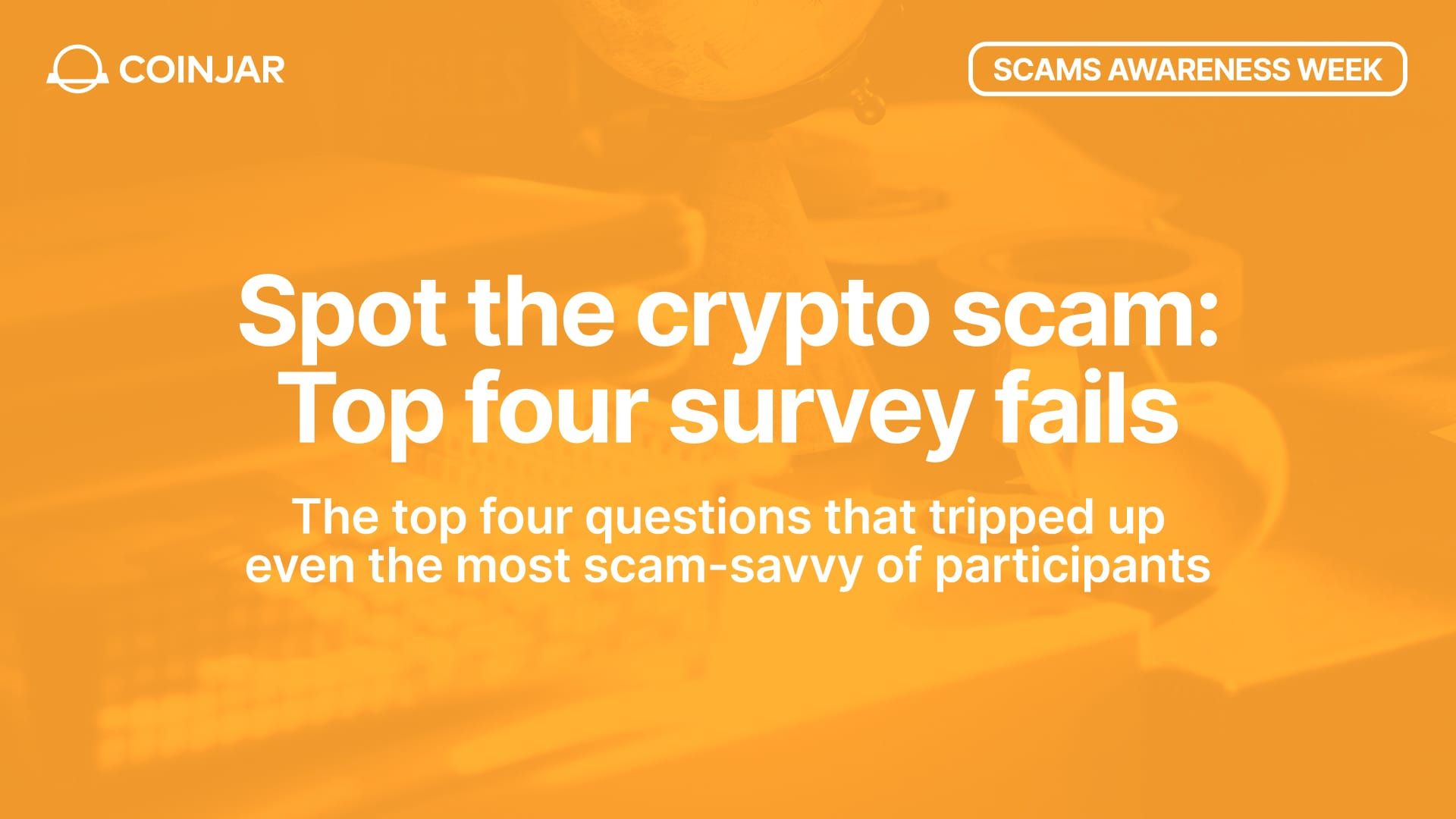Spot the Crypto Scam: Top 4 Survey Fails
September 4, 2024Here, we reveal the top four questions on the quiz that tripped up even the most scam-savvy of participants.
Share this:

Could you spot a crypto scam? As part of Scams Awareness Week 2024, we conducted a "Spot The Scam" quiz. This was to help raise awareness about common scam tactics and how to avoid them.
Here, we reveal the top four questions on the quiz that tripped up even the most scam-savvy of participants.
While these four questions caught out a lot of people, we’re thrilled to report that 90% of respondents scored 90% or higher on the quiz.
Education is key to scam prevention, so it’s great to see an increase in the number of top scorers.
1. Sending money to strangers in emergencies
True/False Statement: "A legitimate romantic interest will often need financial help for emergencies or sudden changes in travel plans."
Result: 5.60% of participants got this incorrect.
Explanation: Emergencies do happen, but in the context of online relationships, this scenario is a classic scam tactic.
Romance scammers create a sense of urgency, manipulating victims into sending money quickly before they can think it through. These scammers often fabricate elaborate stories about being stranded or facing unexpected financial crises.
Once the money is sent, the scammer either disappears or continues to exploit the victim with further demands. Always be cautious and sceptical of any financial requests from someone you’ve never met in person.
2. Keeping investments secret from others
The statement: "Keeping the details of your transactions or investments secret, even from your bank or family, is recommended."
Result: 10.48% of participants got this incorrect.
Explanation: It’s understandable to want to keep personal financial matters private. However, if someone contacts you unexpectedly and advises you to keep a large, sudden, and unplanned transfer of money secret, it’s a major red flag.
Scammers often use this tactic to isolate victims and prevent them from seeking advice that could expose the scam.
It’s essential to stop, check, and verify any suspicious requests before taking action. Transparency with trusted individuals can be a key defence against potential fraud.
3. "Guarantees" when investing
True/False Statement: "Legitimate recovery agencies typically guarantee the return of funds within a specific, short time frame, such as 24 hours, after receiving payment."
Result: 10.11% of participants got this incorrect.
Explanation: In the world of investing, the only guarantee is that there are no guarantees.
This holds especially true when dealing with recovery agencies. Legitimate organisations will be upfront about the challenges involved in recovering funds lost to scams.
The unfortunate reality is that most victims never see their money again.
Be wary of anyone promising swift or guaranteed recovery of your funds. It’s likely another scam trying to capitalise on your loss.
4. Moving dating chats to private conversations
True/False Statement: "A legitimate online love interest will often seek to move communication off of the dating platform to more private channels like email or text messages very quickly."
Result: 36.78% of participants got this incorrect.
Explanation: This question was tricky (on purpose, sorry!). It’s easy to see why so many people were unsure.
It’s very common for relationships to progress to more private communication channels. However it’s well recognised that scammers use this transition to isolate their victims.
Once off the dating platform, they can more easily manipulate and control the conversation, making it harder for the victim to seek help or verify the scammer’s story.
The red flags usually appear when the person insists on privacy, or avoids meeting in person. they could claim to live overseas or interstate.
They may eventually ask for money or recommend that you become involved in an investment that has “changed their life”.
It’s important to be vigilant and cautious whenever an online relationship quickly moves off-platform. This could signal the beginning of a scam.
Crypto scams and knowledge
Scams are constantly evolving. It’s crucial to stay informed and aware of the tactics scammers use to exploit people.
The results of our "Spot The Scam" quiz highlight some of the areas where misconceptions still exist. We need to educate ourselves and share knowledge with others. This way we can better protect ourselves and our communities from falling victim to scams.
Remember, if something doesn’t feel right, it’s always better to stop, check, and verify. Scammers rely on urgency and secrecy. Don’t give them the opportunity. Stay safe, stay informed, and always ask for advice if you’re unsure.
Help fight scams
You can help to fight scams by reporting them to the National Anti-Scam Centre via Scamwatch.gov.au/report-a-scam. Your reports are crucial — they help disrupt scammers, protect others, and prevent financial losses.
Currently, 30% of serious scams are unreported. Reporting can be done anonymously or on behalf of someone else. With your consent, information can be shared with relevant authorities to further combat scams.
You can also report directly to the police at cyber.gov.au/report. Reporting makes a difference.
Share your scam story
Scams Awareness Week 2024 showed us how sharing stories can help stop scams. We're encouraging all Australians to speak up, share and report scams.
Sharing your story helps others to spot, avoid and report scams, and recover from the harms caused by scammers.
Share your scam story using the hashtag #ShareAScamStory to help make Australia a harder target for scammers.
Thanks for joining us for Scams Awareness Week 2024 - we'll see you next year, but you should always be vigilant.
Frequently asked questions
Can I trust a recovery agency that guarantees the return of my funds within a short time frame?
No, legitimate recovery agencies will never guarantee the return of funds within a specific short time frame, such as 24 hours.
In fact, the process of recovering funds lost to scams is often challenging, and there is no guarantee that the funds will be recovered at all.
Be cautious of anyone promising swift or guaranteed recovery, as it’s likely another scam trying to exploit your situation.
What are some common types of crypto scams?
Common crypto scams include:
- Fake investment scams promising guaranteed returns
-Phishing scams trying to steal your private keys
-Fake initial Coin Offerings (ICOs)
-Celebrity endorsements for shady projects on social media
-Romance scams where the victim gives funds to someone they haven't met.
How can I spot a crypto scam?
Be wary of:
-Unsolicited messages
-Promises of free money or guaranteed returns in a short period of time
-Pressure to invest quickly.
-Requests for personal information like credit card details or bank account numbers
-Insistence on using a specific trading platform or digital wallet
-Looking for information to access your crypto wallet
-Fake crypto advisors that offer to help you out of the blue.
How can I protect myself from crypto scams?
Never share your private keys with anyone. Be cautious of investment managers promising high returns with little to no risk.
Do your research before investing in any crypto assets, especially ICOs. If an offer seems too good to be true, it probably is.
What should I do if I think I've been scammed?
If you think you've been scammed, report it to the relevant authorities and your bank or credit card company immediately, or to CoinJar support.
It can be hard to spot cryptocurrency scams. Always do your own research, be sceptical of unsolicited offers, and protect your private keys and personal information.
Why should I be cautious about sending money to someone I've met online, even if they have an emergency?
While emergencies can happen, especially in online relationships, scammers often use fabricated emergencies as a tactic to manipulate victims into sending money quickly.
They create a sense of urgency to prevent you from thinking through the situation or seeking advice. Once the money is sent, the scammer might disappear or continue to ask for more.
It’s essential to be sceptical of any financial requests from someone you’ve never met in person.
The above article is not to be read as investment, legal or tax advice and takes no account of particular personal or market circumstances; all readers should seek independent investment, legal and tax advice before investing in cryptocurrencies. This article is provided for general information and educational purposes only. No responsibility or liability is accepted for any errors of fact or omission expressed therein. CoinJar, Inc. makes no representation or warranty of any kind, express or implied, regarding the accuracy, validity, reliability, availability, or completeness of any such information. Past performance is not a reliable indicator of future results.
Share this:
On/Offchain
Your weekly dose of crypto news & opinion.
Join more than 150,000 subscribers to CoinJar's crypto newsletter.
Your information is handled in accordance with CoinJar’s Privacy Policy.
More from CoinJar Blog

Onchain: Lots of things on sale
January 28, 2026Story One Crypto Social for Sale Been an interesting time to observe what happens to the still-standing crypto social networks. Aave, a leading DeFi protocol and creator of...Read more
CoinJar Unlocks European Expansion with MiCA Authorization
January 21, 2026CoinJar has just become a crypto asset gateway for Europe, having received full authorization from the Central Bank of Ireland as a Crypto-Asset Service Provider under...Read more
Onchain: New Year, Same old industry
January 15, 20262026 has been off to a strong start, with constant drama from the White House. But it’s not on Trump alone to keep our cholesterol levels high. Crypto is contributing its...Read moreYour information is handled in accordance with CoinJar’s Privacy Policy.
Copyright © 2025 CoinJar, Inc. All rights reserved.
CoinJar, Inc. is a registered Money Services Business with FinCEN and licensed as a money transmitter, NMLS #2492913. For a list of states in which CoinJar, Inc. is licensed or authorized to operate, please visit here. In certain other states, money transmission services are provided by Cross River Bank, Member FDIC.
This site is protected by reCAPTCHA and the Google Privacy Policy and Terms of Service apply.